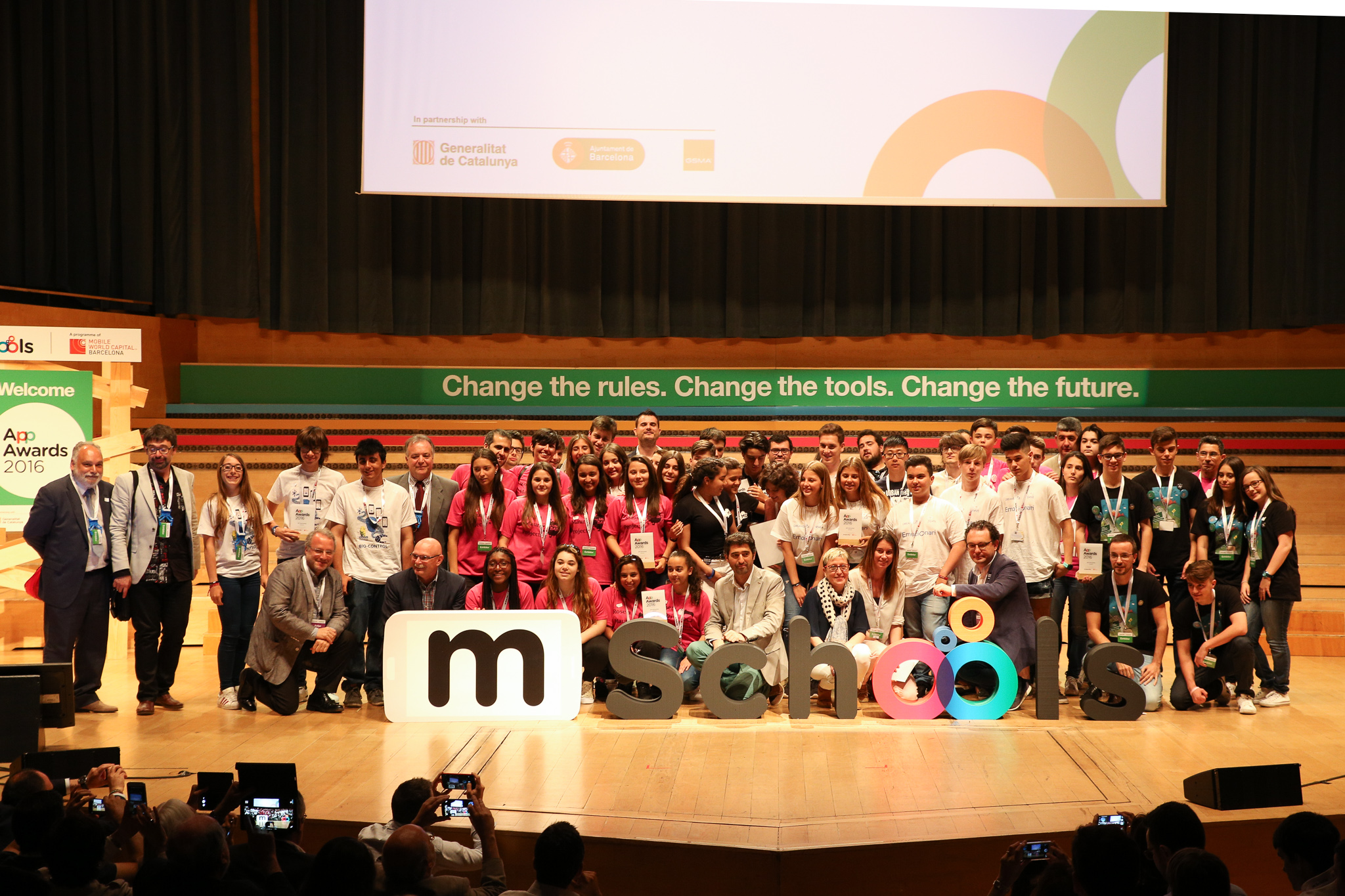
- Over 300 students formed part of the 53 finalist teams that presented their technology projects at L’Auditori today
- mSchools rewarded the best 11 applications and the top 8 digital contents created in Catalonian classrooms by Primary, Secondary, Senior School, and Intermediate-level Vocational Training students.
- The event also recognised the contributions made to the Mobile History Map by Primary and Secondary school students, documenting aspects of 20th-century Catalonian history

June 4, 2016
This morning mSchools issued awards to the top 19 technology projects developed by students at the third edition of the mSchools App Awards, the competition between Catalonian schools held at the close of each academic year. This is a Mobile World Capital Barcelona initiative, in collaboration with the Regional Government of Catalonia, the Barcelona City Council, and GSMA, which brought together for the first time more than 300 students from all across Catalonia, at L’Auditori, to showcase their digital projects developed in the classroom.
The event enjoyed a dynamic, fair-like venue at which students presented their entries and prototypes to the audience and judging panel for about 2 hours. For the first time the mSchools App Awards also featured a specific pitching stage at which students presented prototypes, spotlighting their potential as entrepreneurs.
In the “App Education” category the mSchools App Awards recognised the 11 best mobile applications produced by secondary schools: the Collegi Frangoal, in Castelldefels; Institut Roseta Mauri, in Reus (2 awards); Col·legi Montserrat, in Barcelona; Institut Baix Camp, in Reus (2 awards); Col·legi Inmaculada Concepció, in Lloret de Mar; Institut Mare de Déu de la Candelera, in L’Ametlla de Mar; Col·legi Sagrada Família in Santa Perpètua de Mogoda, Institut Torre del Palau, in Terrassa and the IES Palamós, in Palamós. This category recognises the top apps in the fields of IoT, robotics and device control, leisure and personal management, educational applications and services to the community. A popular vote amongst attendees determined the 11th winner from amongst all the finalists.
Also for the first time, the competition included a specific category dedicated to the “Mobile History Map” (MHM), a ground-breaking project in which Primary and Secondary school students create and geolocate content on points of interest close to their schools. In this category students had to work on the MHM digital platform to meet this year’s challenge: “20th-century Catalonia,” geolocating on the map of Catalonia the memories, testimonies and experiences of their families and ancestors, and relating them to life today. The 8 winning entries were by the Escola Vedruna, in Ripoll (two awards); Escola Mare de Déu dels Torrents, in Vimbodí i Poblet; Escola Baltassar Segú, in Valls; Institut Estany de la Ricarda, in El Prat de Llobregat; Institut la Mar de la Frau, in Cambrils; Escola Nostra Llar, in Sabadell; and the Institut Pere Barnils, in Centelles. The last two winners received an Honourable Mention for the best oral testimony recorded and the most original research from amongst all the finalists.
The 45 winning students in the “App Education” category were awarded a stay at the second edition of the mSchools TechCamp, a tech-centred summer programme specifically created to expand knowledge of the App Education course. The 8 winning teams in the MHM category received a 3D printer for their schools, and a course for teachers on the introduction of this technology in the classroom.
On hand for the event was the Honourable Ms Meritxell Ruiz, Minister of Education for the Regional Government of Catalonia; Mr Jordi Puigneró, Secretary of Information and Communication Technology Governance for the City Council of Barcelona; Mr Agustí Colom, Councillor for Employment, Business and Tourism; Ms Carmen Andrés, Councillor for Children, Young People and Seniors for the City Council of Barcelona; Mr John Hoffman, CEO of GSMA, Ltd., and Mr Aleix Valls, CEO of Mobile World Capital Barcelona.
Recognising talent, effort, work and creativity
The third edition of the mSchools App Awards drew participation by more than 4,000 students from across Catalonia. The “App Education” category attracted more than 800 students, who submitted more than 200 entries, a figure marking a 60% increase over last year’s edition. The new category dedicated to the “Mobile History Map” saw participation by more than 3,400 Primary and Secondary school students, who contributed more than 150 geolocated contents on the map, with noteworthy information about sites close to their schools.
The finalists, 45 in the first category and 8 in the second, displayed their creations at the mSchools App Contest’s fair space, where they interacted directly with the judging panel and event attendees. Students also participated in public pitching sessions, at which they were able to present their projects on a stage set up specifically for this purpose.
The winning apps at the third edition of the mSchools App Awards
The panel, made up of professionals from the new technologies, innovation, creativity and education fields, and headed up by John Hoffman, CEO of GSMA Ltd., visited each finalist team’s stand and attended each group’s presentations. They then deliberated, on site, and announced the winners in each category.
Details on the categories and winners
APP EDUCATION
IoT, robotics and device control – award presented by Jordi Puigneró, Secretary of ICT Governance for the Regional Government of Catalonia.
- Secondary Education (ESO) winner: Collegi Frangoal, in Castelldefels. Application: “Bio-Control.”
- Senior and vocational training schools winner: Institut Roseta Mauri, in Reus. Application: “My Little Baby.”
Leisure and personal management – award presented by Aleix Valls, CEO of Mobile World Capital Barcelona.
- Secondary Education (ESO) winner: Col·legi Montserrat, in Barcelona. Application: “Kofu.”
- Senior and vocational training schools winner: Institut Baix Camp, in Reus. Application: “La Guerra de les Catlàxies.” (“CatStar Wars”)
Educational applications – award presented by Constantí Serrallonga, CEO of Fira de Barcelona.
- Secondary Education (ESO) winner: Col·legi Inmaculada Concepció in Lloret de Mar. Application: “EduKkds.”
- Senior and vocational training schools winner: Institut Baix Camp in Reus. Application: “Aprendre xinès” (Learn Chinese).
Community and citizenship services – award presented by Carmen Andrés, Councillor for Children, Youth and Senior Citizens for the Barcelona City Council.
- Secondary Education (ESO) winner: Institut Mare de Déu de la Candelera in L’Ametlla de Mar. Application: “Emocionari.” (Dictionary of Emotions).
- Senior and vocational training schools winner: Institut Roseta Mauri. Application: “Auto.me.”
Audience Award – presented by John Hoffman, CEO of GSMA Ltd.
- Winner: Collegi Sagrada Família in Santa Perpètua de Mogoda. Application: “Screwie.”
Honourable Mention: Best Presentation – presented by Albert Sáez, Deputy Director of El Periódico.
- Winner: Institut Torre del Palau, in Terrassa. Application: “Make Music.”
Honourable Mention: communication and marketing campaign – award presented by Albert Sáez, Deputy Director of El Periódico.
- Winner: IES Palamós. Application: “StickSlaughter.”
MOBILE HISTORY MAP
Primary school students – prize presented by Jordi Puigneró, Secretary of ICT Governance for the Regional Government of Catalonia.
- 1st prize: Escola Vedruna, in Ripoll. Contribution: “El tren del segle xx a Ripoll” (20th-Century Trains in Ripoll)
- 2nd prize: Escola Mare de Déu dels Torrents, in Vimbodí i Poblet. Contribution: “Any Potau/Campdesunyer.” (The Potau/Campdesunyer Year)
- 3rd prize: Escola Baltassar Segú, in Valls. Contribution: “A Valls, castells.” (Castles in Valls)
Secondary school students – prize presented by Aleix Valls, CEO of Mobile World Capital Barcelona.
- 1st prize: Institut Estany de la Ricarda, in El Prat de Llobregat. Contribution: “El patrimoni industrial del Prat de Llobregat” (El Prat de Llobregat’s Industrial Heritage).
- 2nd prize: Institut la Mar de la Frau, in Cambrils. Contribution: “Cambrils i el mar” (Cambrils and the Sea).
- 3rd prize: Escola Vedruna in Ripoll. Contribution: “L’empremta tèxtil a Ripoll” (The Textile Industry’s Mark on Ripoll).
Honourable Mention: best oral testimony recorded – prize presented by Jordi Puigneró, Secretary of ICT Governance for the Regional Government of Catalonia.
- Winner: Escola Nostra Llar, in Sabadell. Contribution: “Oficis del segle xx” (20th-century Trades).
Honourable Mention: most original research, presented by Aleix Valls, CEO of Mobile World Capital Barcelona.
- Winner: Institut Pere Barnils, in Centelles. Contribution: “Centelles comença el segle xx. La força i el savi” (Centelles Begins in the 20th century. Strength and the Wiseman).
mSchools, a project integrated into Catalonian classrooms
mSchools is a Mobile World Capital Barcelona initiative, in collaboration with the Regional Government of Catalonia, the Barcelona City Council and GSMA. This pioneering program promotes work in classrooms with mobile technology through the creation and use of mobile solutions. The aim is to enhance students’ skills in the digital sphere, reduce dropout rates, and improve academic performance.
“App Education,” the course focusing on the conceptualisation, design and development of mobile application prototypes, has tripled the number of students enrolled in three years, growing from 6,000 students in its first year to 18,000 in its third, working with close to 400 schools.
The Mobile History Map now boasts more than 5,000 contributions in the form of geolocated points. Finally, the Toolbox platform, one of the latest mSchools initiatives to be promoted, brings together educational mobile applications evaluated by teachers and education professionals. The resource already lists 700 registered applications and 1,300 validations, equipping teachers with qualitative criteria to choose the best apps for use in the classroom.
Stay up to date about everything
Subscribe to stay up to date with the latest content from Mobile World Capital Barcelona.